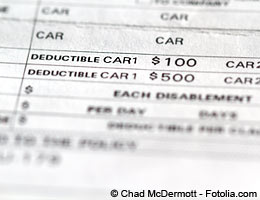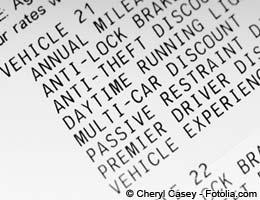4 other questions when you buy insurance

For many of us, shopping for insurance mainly comes down to one big question: How much does it cost? But focusing on price alone could be a costly mistake if you don't get adequate coverage. Premiums do matter, but they're not the most important thing.
"Price is last" when shopping for insurance, says Thomas Capp, vice president of sales at San Francisco-based Esurance, an Allstate company. "Often we see customers focused solely on price, and they make the mistake of not getting what they need."
It's important to educate yourself, which means understanding how insurance works and what you want it to do. That way, you'll be sure to ask all the right insurance questions before you buy a policy.
How much coverage do I need?

Before you start comparison-shopping for insurance, think about what you're trying to protect. For instance, if you're looking for auto insurance, are you mainly concerned about covering your vehicle against damage? Or do you have other assets, such as a home, which would need financial protection if you hurt someone in a crash?
Same goes for homeowners insurance. Is insurance to fix your home enough, or do you need to protect yourself financially if someone is injured on your property?
These are insurance questions pertaining to coverage. To figure out how much to buy, consider every possible way things could go bad, says Ron Moore, a senior product manager at MetLife Auto & Home. "You have to think through what happens if the major breadwinner passes on, or what happens in a major auto accident and you are negligent."
Online tools, such as a Bankrate life insurance calculator, can help you determine the amount of coverage you need. If you're using an insurance agent, make sure he or she uses a detailed checklist and asks thorough questions that go beyond what's on the application, says Bill Wilson, a senior vice president with the Independent Insurance Agents & Brokers of America.
How much risk do I want to accept?

Once you know the level of coverage you want, think about the amount of risk you can handle.
In most cases, a higher deductible will lower your monthly premiums. But you have to ask yourself: Can you afford the risk of having to pay that $1,000 deductible if something does happen?
According to Capp, the amount of risk you can take boils down to cash flow. If you have a lot of cash coming in and can afford more expensive premiums, then go with a lower-deductible plan. If money is tight, then a cheaper high-deductible plan probably makes more sense.
The deductible isn't the only risk you have to consider; think again about worst-case scenarios. Are there some that aren't worth insuring against? For instance, some homeowners insurance policies cover hidden damage, such as mold in your walls caused by leaking water pipes. Other policies won't cover that, says Wilson. Some people may pay for the extra protection, while others are willing to take the chance nothing will happen.
"It's important that the policies procured by the agent reflect your exposures to loss" and the risks you're willing to accept, Wilson says.
Is the insurance company stable?

When shopping for insurance, one of the last things many consumers think about is whether the insurance company will still be around to pay out a claim. But it's an insurance question you can't ignore.
"Customer service is important, but first you have to make sure the company is financially strong," says Loretta Worters, a spokeswoman for the Insurance Information Institute. You don't want to find yourself in a situation where you get sick or your house burns down, and your insurance company doesn't have the cash to cover your claim.
One way to confirm that an insurer is financially stable is to check its rating with A.M. Best Co., a credit rating agency that assesses the creditworthiness of insurers. A.M. Best rates insurers based on their balance sheets, operating performance and business profile.
Capp says go with an insurer that has at least an A rating from A.M. Best. "You want to make sure they are going to be around," he says. "If there's a choice between a B-rated company with great claims service and an A-rated company with average customer satisfaction, I'd take the A-rated one any day."
Am I getting every possible discount?

Whether you are shopping for auto, homeowners, rental, health or life insurance, there usually are discounts available to you, including many you may not know about.
For example, the Independent Insurance Agents & Brokers of America says some insurance companies now offer lower rates to new customers. Sometimes you can save money simply by opening a new policy with an insurer you're already doing business with; if you have a homeowners insurance policy, you may save by moving your auto insurance to the same company. Other discounts are less familiar, such as price cuts to young drivers involved in organizations such as the Boy Scouts or Girl Scouts.
Insurers have myriad discounts, and new ones are being introduced all the time. So it's important you're getting all the breaks you qualify for when you're asking insurance questions. Researching on the Internet to arm yourself with all the important data before speaking with your agent or the insurance company will put you in the best position to get coverage that meets your needs at the right price.
"You shouldn't rely totally on anybody," says Worters. "You have to be your own advocate."
Source: http://www.bankrate.com/finance/insurance/insurance-questions-besides-price.aspx
madonna halftime show linsanity the alamo anencephaly tesla model x lou gehrig toby mac
No comments:
Post a Comment
Note: Only a member of this blog may post a comment.